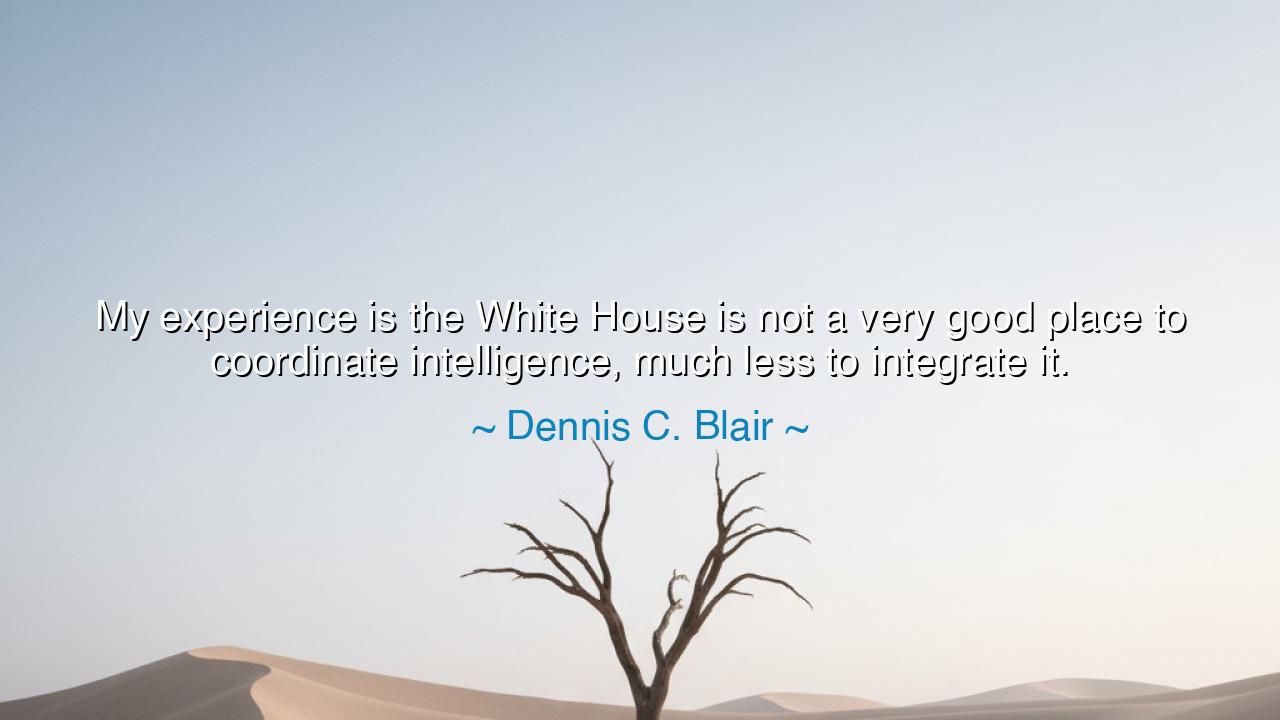
My experience is the White House is not a very good place to
My experience is the White House is not a very good place to coordinate intelligence, much less to integrate it.






The words of Dennis C. Blair, a man who once served as the Director of National Intelligence, ring with the weary wisdom of one who has stood within the heart of power and seen both its brilliance and its blindness: “My experience is the White House is not a very good place to coordinate intelligence, much less to integrate it.” Though uttered in the plain cadence of a statesman, this statement carries a truth as old as governance itself—the truth that power often confuses control with understanding, and that true wisdom cannot flourish where pride and politics obscure clarity. Blair’s reflection is not an accusation, but a revelation: that even the greatest seat of authority is not always the best crucible for truth.
To understand these words, one must first know their source. Dennis Blair, a seasoned naval officer and intelligence leader, spoke from deep experience in the labyrinth of America’s national security apparatus. His task as Director of National Intelligence was to bring unity to a fractured empire of agencies—the CIA, the NSA, the FBI, and others—each guarding its own secrets and methods. In theory, the White House stood as the summit where these rivers of information should converge. But in practice, Blair found what many before him had discovered: that the center of power is not always the center of wisdom. The walls of the White House echo with politics, ambition, and image; intelligence, by contrast, requires patience, humility, and the quiet search for truth uncolored by desire.
Blair’s lament recalls the struggles of countless leaders who have sought to unite diverse sources of knowledge under a single guiding hand. In the ancient courts of kings, there were always many advisers—generals, priests, philosophers, spies—each bearing a fragment of truth. Yet even the wisest rulers often fell to ruin when they tried to force harmony where complexity demanded respect. So it was in the halls of emperors and caliphs, and so it remains in the corridors of the modern state. The White House, in its majesty, symbolizes command; but command is not comprehension. The act of coordinating intelligence—of blending many voices into one clear insight—is an art that requires not dominance, but discipline, and not haste, but humility.
Consider the tale of King Xerxes of Persia, who launched his vast invasion of Greece. Surrounded by advisors who feared to tell him the truth, he mistook obedience for intelligence and arrogance for strategy. His empire’s vastness became its own undoing, and his armies, though mighty, marched in ignorance. The lesson of Xerxes is the lesson of Blair’s age: that the higher one climbs in power, the harder it becomes to hear the voice of truth amid the chorus of ambition. The White House, as Blair observed, is too often a stage for performance rather than a temple for reflection—a place where intelligence is used not to illuminate reality, but to justify decisions already made.
What Blair sought, and what he found lacking, was integration—the joining of knowledge from many minds into a unified vision. To “coordinate” intelligence is to gather reports; to “integrate” it is to discern meaning. The first can be achieved by authority; the second requires wisdom. It is the difference between listening and understanding, between hearing the wind and reading the storm. And as Blair discovered, the machinery of politics, driven by urgency and optics, is ill-suited to the delicate art of integration. The truth does not always serve political expediency; often, it stands in its way.
His words, though born of national service, extend far beyond the realm of government. For in every human endeavor—whether in leadership, business, or the soul’s own governance—the same law applies: true coordination is born not of control, but of trust. To integrate intelligence, one must first value diversity of thought, must create spaces where contradiction is not punished but examined. The wise leader does not seek to silence the many to exalt the one; he seeks to harmonize them into a greater understanding. The White House failed, Blair suggests, because it mistook hierarchy for harmony, command for communion.
Therefore, O listener, let this be your lesson: in your own life, when you gather knowledge, whether from the world, from others, or from your own experience, do not merely collect—integrate. Do not build a White House within your mind, where ego reigns and truth must conform to desire. Instead, be as the philosopher-king of old—one who listens to all voices, who values understanding above victory. Know that intelligence without humility becomes blindness, and authority without wisdom becomes folly.
And so, as Dennis Blair reminds us, the true seat of intelligence is not in the palace or the government office, but in the mind disciplined by truth and the heart unafraid of complexity. The wise do not seek to rule over knowledge, but to serve it. They do not twist facts to fit their purpose, but mold their purpose to fit the facts. For only in this way can one lead wisely—whether a nation or a soul—and turn the chaos of information into the harmony of understanding.






AAdministratorAdministrator
Welcome, honored guests. Please leave a comment, we will respond soon